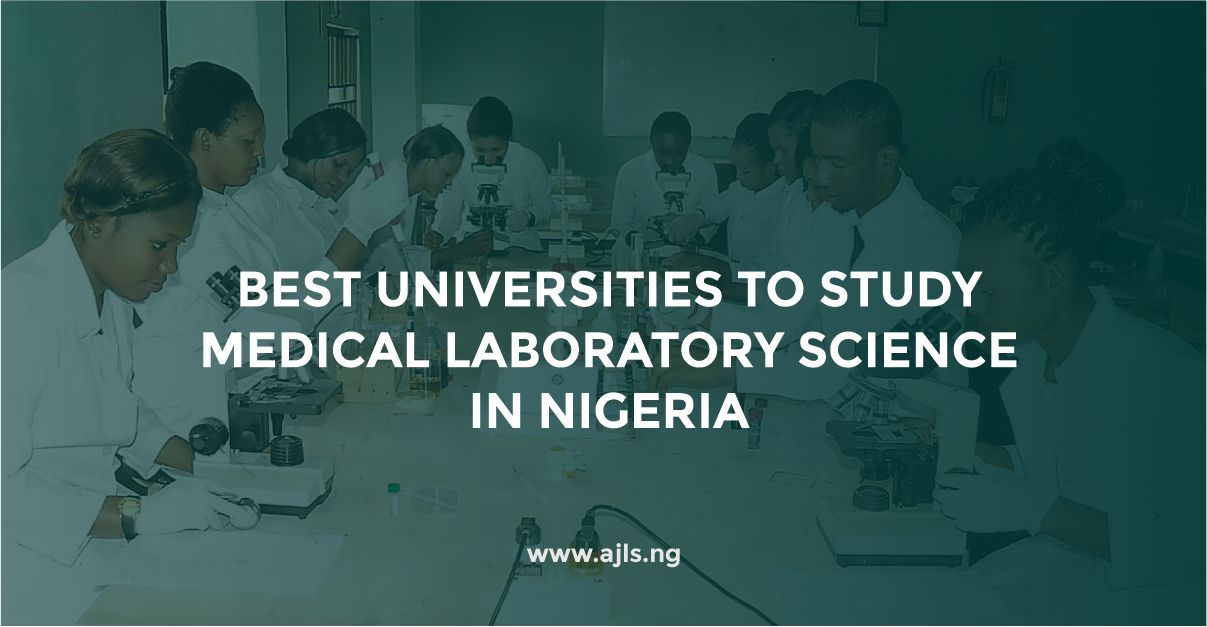Best Universities to Study Medical Laboratory Science in Nigeria

If you are thinking about studying Medical Laboratory Science in Nigeria, you are stepping into one of the most vital and in-demand healthcare professions. But not all universities offer the same quality of education, especially when it comes to the hands-on experience and modern lab facilities that this field requires.
The best universities go beyond classroom lectures; they provide direct access to clinical settings, well-maintained laboratories, and experienced lecturers who know what it takes to succeed in the profession. Another big thing to look out for is whether the program is accredited by the Medical Laboratory Science Council of Nigeria. This ensures your degree will be recognized and respected both locally and internationally.
Best Universities to Study Medical Laboratory Science
To give yourself quality education, you need to search for universities that have a top-notch learning system when it comes to Medical Laboratory Science. These schools have a reputation for excellence in medical training and are known for producing highly skilled professionals.
Many of them have long-standing partnerships with teaching hospitals where students gain real-world experience, and their graduates often go on to become leaders in diagnostic and public health laboratories. Choosing any of these universities could give you the edge you need to thrive in this dynamic and rewarding field.
Top-Tier Universities with Quality Learning Environment in Medical Laboratory Science
Here are some of the best universities in Nigeria to study Medical Laboratory Science, known for their academic excellence, modern laboratory facilities, and accreditation by the Medical Laboratory Science Council of Nigeria (MLSCN):
Top Public Universities
University of Lagos (UNILAG)
- Strong academic structure
- Well-equipped teaching hospital (LUTH)
- High admission competition
Ahmadu Bello University (ABU Zaria)
- One of Nigeria’s largest universities with a strong focus on medical sciences
- Affiliated with a reputable teaching hospital (ABUTH)
- Comprehensive clinical training program
University of Nigeria, Nsukka (UNN)
- Well-established medical faculty
- Highly rated Medical Laboratory Science department
- Strong research emphasis
University of Benin (UNIBEN)
- Accredited by MLSCN
- Strong mix of theory and practical exposure
- Offers postgraduate studies in Medical Laboratory Science
Obafemi Awolowo University (OAU)
- Highly respected medical college
- Exceptional laboratory infrastructure
- Engages students in public health and research-based training
Top Private Universities
Babcock University
- One of the few private universities offering MLS
- Modern lab equipment and facilities
- Strong student support and academic discipline
Other Notable Mentions
- University of Calabar (UNICAL)
- Ladoke Akintola University of Technology (LAUTECH)
- University of Jos (UNIJOS)
- Madonna University (for private option)
General Admission Requirements for these Universities
Here are the general admission requirements for studying Medical Laboratory Science (MLS) in top Nigerian universities. While specific details may vary slightly by institution, most universities follow these common criteria:
O’Level Requirements (WAEC/NECO/NABTEB)
Minimum of five (5) credit passes in relevant subjects. Must be obtained in not more than two sittings.
- English Language
- Mathematics
- Biology
- Chemistry
- Physics
JAMB UTME Requirements
Compulsory UTME Subjects:
- English Language (compulsory)
- Biology
- Chemistry
- Physics
Note: Recommended minimum UTME score: 180–200+ for public universities (e.g., UNILAG, ABU, UNN). 160–180+ for some state and private universities (e.g., Madonna, Babcock)
Post UTME Screening
Most universities conduct a Post-UTME screening test or interview. Candidates are assessed based on:
- UTME score
- O’Level grades
- Performance in the university’s internal exam or screening
Direct Entry (DE) Admission
For candidates entering through Direct Entry (DE), requirements typically include:
- ND/HND in Medical Laboratory Science, or
- NCE/A-Level passes in Biology, Chemistry, and Physics.
- Some universities require candidates to register through JAMB Direct Entry and meet additional internal screening requirements.
Age and Other Criteria
- Candidates must generally be 16 years of age or older.
- Private universities may require additional documents like references or character attestation.
Possible Job Opportunities for Graduates of Medical Laboratory Science
Graduates of Medical Laboratory Science (MLS) have a broad range of job opportunities across both clinical and non-clinical sectors due to the vital role they play in healthcare diagnostics, disease surveillance, and research. Below are some of the most prominent career paths available:
Clinical & Hospital Roles
Medical Laboratory Scientist
- Works in hospital labs analyzing blood, tissues, and fluids to aid diagnosis.
- May specialize in areas like microbiology, hematology, clinical chemistry, or histopathology.
Pathology Lab Scientist
- Supports pathologists by preparing and examining samples related to diseases like cancer.
Public Health Laboratory Officer
- Works with government or international agencies (e.g., NCDC, WHO) on disease tracking and outbreak response.
Blood Bank Specialist
- Involved in blood collection, typing, transfusion services, and quality assurance in blood banks.
Research & Academia
Research Scientist
- Employed by research institutes, universities, or pharmaceutical firms for disease studies, drug development, or molecular diagnostics.
Lecturer/Academic Staff
- Teaches in universities or colleges of health technology; typically requires postgraduate qualifications.
Regulatory & Government Agencies
MLS Council Officer
- Works with the Medical Laboratory Science Council of Nigeria (MLSCN) in quality control, accreditation, and policy formulation.
Health Ministry Analyst
- Engaged in national health planning, surveillance systems, or infectious disease monitoring.
Private Sector & Entrepreneurial Opportunities
Diagnostic Lab Owner/Manager
- Operate or manage a private medical laboratory offering diagnostic testing services.
Sales/Marketing for Medical Equipment & Reagents
- Employed by medical or pharmaceutical companies as product specialists or technical consultants.
Forensic Laboratory Scientist
- Works with law enforcement or legal agencies on criminal investigations involving biological samples.
International & NGO Opportunities
Field Lab Scientist
- Employed by NGOs like Médecins Sans Frontières (MSF) or the WHO for global health projects and outbreak responses.
Clinical Trials Coordinator
- Works in international pharmaceutical or clinical research organizations, managing lab aspects of clinical trials.
Conclusion
We hope this article has been of great help to you. Let us know your thoughts in the comment section below. We would like you to check back on this page for more relevant information about universities, polytechnics, and colleges of education.
You can bookmark or save this page for a revisit. If you have any questions or further inquiries, kindly drop them in the comment box below. Also, endeavor to share this page with family and friends to keep them posted with this information.





